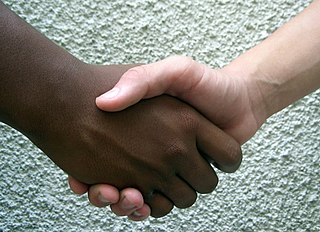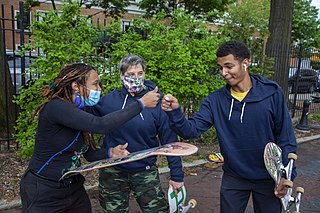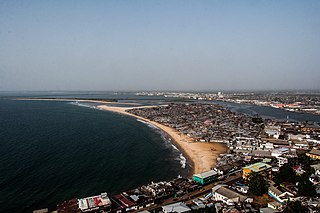Related Research Articles

Liberia, officially the Republic of Liberia, is a country on the West African coast. It is bordered by Sierra Leone to its northwest, Guinea to its north, Ivory Coast to its east, and the Atlantic Ocean to its south and southwest. It has a population of around 5 million and covers an area of 43,000 square miles (111,369 km2). English is the official language, but over 20 indigenous languages are spoken, reflecting the country's ethnic and cultural diversity. The country's capital and largest city is Monrovia.

Liberia is a country in West Africa founded by free people of color from the United States. The emigration of African Americans, both free and recently emancipated, was funded and organized by the American Colonization Society (ACS). The mortality rate of these settlers was the highest among settlements reported with modern recordkeeping. Of the 4,571 emigrants who arrived in Liberia between 1820 and 1843, only 1,819 survived (39.8%).

A salute is usually a formal hand gesture or other action used to display respect in military situations. Salutes are primarily associated with the military and law enforcement, but many civilian organizations, such as Girl Guides, Boy Scouts and the Salvation Army use formal salutes. Ordinary civilians also salute informally to greet or acknowledge the presence of another person, such as a tip of the hat or a hand wave to a friend or neighbour.

A handshake is a globally widespread, brief greeting or parting tradition in which two people grasp one of each other's like hands, in most cases accompanied by a brief up-and-down movement of the grasped hands. Customs surrounding handshakes are specific to cultures. Different cultures may be more or less likely to shake hands, or there may be different customs about how or when to shake hands.

In Western culture, "the finger", or the middle finger is an obscene hand gesture. The gesture communicates moderate to extreme contempt, and is roughly equivalent in meaning to "fuck you", "fuck me", "shove it up your ass/arse", "up yours" or "go fuck yourself". It is performed by showing the back of a hand that has only the middle finger extended upwards, though in some locales, the thumb is extended. Extending the finger is considered a symbol of contempt in several cultures, especially in the Western world. Many cultures use similar gestures to display their disrespect, although others use it to express pointing without intentional disrespect. The gesture is usually used to express contempt but can also be used humorously or playfully.

Monrovia is the capital city of the West African country of Liberia. Founded in 1822, it is located on Cape Mesurado on the Atlantic coast and as of the 2008 census had 1,010,970 residents, home to 29% of Liberia’s total population. As the nation's primate city, Monrovia is the country's economic, financial and cultural center; its economy is primarily centered on its harbor and its role as the seat of Liberian government.

The Roman salute is a gesture in which the right arm is fully extended, facing forward, with palm down and fingers touching. In some versions, the arm is raised upward at an angle; in others, it is held out parallel to the ground. In contemporary times, the former is commonly considered a symbol of fascism that had been based on a custom popularly attributed to ancient Rome. However, no Roman text gives this description, and the Roman works of art that display salutational gestures bear little resemblance to the modern Roman salute.

The middle finger, long finger, second finger, third finger, toll finger or tall man is the third digit of the human hand, located between the index finger and the ring finger. It is typically the longest digit. In anatomy, it is also called the third finger, digitus medius, digitus tertius or digitus III.

Namaste, sometimes called namaskar and namaskaram, is a customary Hindu non-contact manner of respectfully greeting and honouring a person or group, used at any time of day. It is found on the Indian subcontinent, and among the Nepalese and Indian diaspora. Namaste is usually spoken with a slight bow and hands pressed together, palms touching and fingers pointing upwards, thumbs close to the chest. This gesture is called añjali mudrā; the standing posture incorporating it is pranamasana.

A fist bump is a gesture similar in meaning to a handshake or high five. A fist bump can also be a symbol of giving respect or approval, as well as companionship between two people. It can be followed by various other hand and body gestures and may be part of a dap greeting. It is commonly used in sports as a form of celebration with teammates and with opposition players at the beginning or end of a game. Fist bumps are often given as a form of friendly congratulation.

The elbow bump is an informal greeting where two people touch elbows. Interest in this greeting was renewed during the avian flu scare of 2006, the 2009 swine flu pandemic, the Ebola outbreak of 2014, and the COVID-19 pandemic when health officials supported its use as an alternative to hand-shaking to reduce the spread of germs. During the latter pandemic, authorities advised that even an elbow bump was too risky, and suggested greeting from a distance.

West Point is a township of the Liberian capital city of Monrovia, located on a 0.53 km2 peninsula which juts out into the Atlantic Ocean between the Mesurado and Saint Paul rivers. West Point is one of Monrovia's most densely populated slums.

Guéckédou or Guékédou is a town in southern Guinea near the Sierra Leone and Liberian borders. It had a population of 79,140 in 1996 (census) but has grown massively since the civil wars and, as of 2008, it is estimated to be 221,715. It was a centre of fighting during the Second Liberian Civil War and the Sierra Leone Civil War in 2000 and 2001.

The 2013–2016 epidemic of Ebola virus disease, centered in Western Africa, was the most widespread outbreak of the disease in history. It caused major loss of life and socioeconomic disruption in the region, mainly in Guinea, Liberia and Sierra Leone. The first cases were recorded in Guinea in December 2013; later, the disease spread to neighbouring Liberia and Sierra Leone, with minor outbreaks occurring in Nigeria and Mali. Secondary infections of medical workers occurred in the United States and Spain. In addition, isolated cases were recorded in Senegal, the United Kingdom and Italy. The number of cases peaked in October 2014 and then began to decline gradually, following the commitment of substantial international resources.

An epidemic of Ebola virus disease occurred in Liberia from 2014 to 2015, along with the neighbouring countries of Guinea and Sierra Leone. The first cases of virus were reported by late March 2014. The Ebola virus, a biosafety level four pathogen, is an RNA virus discovered in 1976.

This article covers the timeline of the 2014 Ebola virus epidemic in West Africa and its outbreaks elsewhere. Flag icons denote the first announcements of confirmed cases by the respective nation-states, their first deaths, and their first secondary transmissions, as well as relevant sessions and announcements of agencies such as the World Health Organization (WHO), the U.S. Centers for Disease Control (CDC), and NGOs such as Doctors Without Borders; medical evacuations, visa restrictions, border closures, quarantines, court rulings, and possible cases of zoonosis are also included.

The Ebola virus epidemic in West Africa has had a large effect on the culture of most of the West African countries. In most instances, the effect is a rather negative one as it has disrupted many Africans’ traditional norms and practices. For instance, many West African communities rely on traditional healers and witch doctors, who use herbal remedies, massage, chant and witchcraft to cure just about any ailment. Therefore, it is difficult for West Africans to adapt to foreign medical practices. Specifically, West African resistance to Western medicine is prominent in the region, which calls for severe distrust of Western and modern medical personnel and practices.(see Ebola conspiracies below.)

Cases of the Ebola virus disease in Nigeria were reported in 2014 as a small part of the epidemic of Ebola virus disease which originated in Guinea that represented the first outbreak of the disease in a West African country. Previous outbreaks had been confined to countries in Central Africa.
The Nathaniel Varney Massaquoi Elementary and Junior High School is a public school within Liberia's Monrovia Consolidated School System, located in the West Point Township. The school was established in 1972, and is named for Nathaniel Varney Massaquoi (1905–1962), a Liberian educator and politician from the Vai community, who rose to become Secretary of Public Instruction. It serves as the only government school for a township of some 80,000 residents. The school received global attention in 2014–2015, when it was attacked during protests amidst the 2014 Ebola crisis, and was then restored, painted with bright murals, and reopened through international efforts.
References
- ↑ Leanne Olson (2009). A Cruel Paradise: Journals of an International Relief Worker. Insomniac Press. pp. 50–. ISBN 978-1-897414-89-7.
- ↑ Ayodeji Olukoju (2006). Culture and Customs of Liberia. Greenwood Publishing Group. pp. 119–. ISBN 978-0-313-33291-3.
- ↑ "Ebola outbreak: How Liberia lost its handshake". BBC News. 20 September 2014.